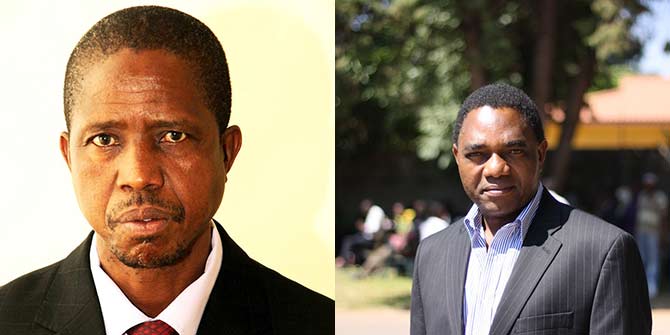LSE academics reflect on a key story of 2015 along with what they expect from 2016.
Dr Joanna Lewis – Assistant Professor in Imperial and African History, Department of International History
In 2015, once again, events in Africa define the historical conversation between ourselves and our sense of our own humanity. First, in September, a new human ancestor was discovered in caves deep in South Africa. Homo Naledi could be among the first of humankind (genus Homo) living in Africa three million years ago. Before this discovery, it was believed only Homo sapiens experienced love and compassion enough to bury their dead. Not so. Meanwhile in July, global society mobilised to an unprecedented fever-pitch when Cecil, a lion in Zimbabwe, was killed for sport by a US game tourist after bribing officials. Mass hatred was expressed for a man who could inflict a slow, painful death on an animal. Yet it also provided a moment to reflect on why similar outrage was not expressed for the 147 victims of an Islamist terrorist attack in Kenya in the previous April.

2016 will possibly see Zimbabwe and South Africa take centre stage again momentarily. President Mugabe looks increasingly frail and South Africa’s domestic tranquillity looks near to fade-out. But world attention is likely to refocus quickly more north again. Post-colonial historical hang-overs now look so last century, with European bilateral relations focused on countries generating economic migrants and rogue terrorists. The colonial past might be dead but it is not buried either.
Dr Bronwen Manby – Visiting Fellow, Centre for the Study of Human Rights
The adoption of the Sustainable Development Goals in September 2015 and the outcome of the COP21 Paris climate talks that took place in December 2015 are perhaps the two most important developments at global level, each with a potentially profound impact on Africa.
Dr Elliott Green – Associate Professor, Department of International Development
My main story for 2015 was the release in July of the 2015 revision of the UN’s World Population Prospects, which was the first revision of UN demographic data since 2013. The report confirmed the ever-upward trend in African population as a result of the continent’s stalled fertility transition, with an update in the projection for African population in 2050 (medium variant) by around 90 million people (from 2.39 to 2.48 billion). What is interesting is that the higher estimates of the African population do not come from the most populous country in Africa, Nigeria, whose projected population has been adjusted downwards from 440 million to 399 million in 2050. Instead they come from countries like the Democratic Republic of Congo (adjusted upwards from 155 to 195 million) and Angola (adjusted from 54 to 65 million). Thus the worrying trend is not only that Africa is experiencing explosive population growth but that much of this growth is coming from highly unstable, unequal countries with a long history of violence like Angola and the DRC.
My most anticipated story for 2016 is the effects of El Niño on Africa, especially in southern Africa. The El Niño Southern Oscillation (ENSO) is a periodic weather event that leads to warmer surface water temperatures in the Pacific but can lead to unusual rain patterns throughout the world. The 2015-2016 ENSO is predicted to be the strongest El Nino since 1997, when massive floods affected large parts of eastern Africa. This time around there are worries that the ENSO will lead to below-average rainfall over the 2015-2016 summer months across many countries in southern Africa, and could sharply worsen food access among already poor households in such countries as Malawi and Zimbabwe.
The views expressed in this post are those of the authors and in no way reflect those of the Africa at LSE blog or the London School of Economics and Political Science.





Dear Joanna Lewis, as an African, I am grateful for the compassion regarding the massacre of 147 students in Kenya by terrorists. It requires a keener eye and an open mind to note the social prejudice in this world comparing it with the reaction and support that France received in her trying times. Concerning Mugabe, we are sad that a bold African leader is growing frail. We understand the West may hate him for reclaiming back the land of African people that was robbed by British South Africa Company.
Dear Elliot Green, it is true that population of Africans has been growing, not in the past decade, but throughout history unless in circumstances where the Western world has intervened to disrupt that natural process. In 2015, there was an attempt by WHO and Bill Gates Foundation to sterilize Kenyan women within reproductive age. We will be glad to have a population expert probably from LSE to look into the matter. I hope you are aware of the claim that the world is running out of resources as false. Instability in Africa is an engineered geopolitical agenda, initiated by TNCs and local Elites they support while siphoning resources out of Africa. Despite these problems that the Western world Corporations has put us in, we have adapted, survived and multiplied. Our problem is not population, Africa is very big and resourceful. Our problem is your corporations and governments that must manipulate us to survive.
Dear Bronwen Manby, I am an environmentalist and a student of sustainability. Climate change is a fishy agenda, especially in the developing countries. It is clear even from this post that there is not much ways you can attach Africa with it. I wish more energy and resources was spent on investigating environmental pollution, over-fishing in African Maritime borders, dumping of e-waste and other defective products in Africa , illegal logging in Congo Forest to supply demand for timber in the developed world and the list goes on and on.
,